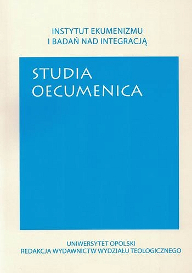Ecumenical issues in Józef Herbut’s philosophy of religion
Ecumenical issues in Józef Herbut’s philosophy of religion
Author(s): Kazimierz M. WolszaSubject(s): Christian Theology and Religion, Philosophy, History of Philosophy, Epistemology, Logic, Ethics / Practical Philosophy, Aesthetics, Theology and Religion, Early Modern Philosophy, History of Religion
Published by: Uniwersytet Opolski
Keywords: ecumenism; doctrinal dialogue; philosophy of religion; religious language; logic;
Summary/Abstract: The philosophy of religion constituted one of the main fields of research by Prof. Józef Herbut. He created an original version of the analytical philosophy of religion. With the use of logical means, he analysed various dimensions of religion, primarily religious language. During the last period of his work, Herbut included ecumenical issues in his philosophical research. His research on these issues consisted of two stages. During the first stage, Herbut tried to create a specific logic of ecumenism. He hypothesised that the reason for the crisis of ecumenical dialogue consists in the lack of a clearly defined goal. Using the logical set theory, Herbut constructed possible models of doctrinal unity of different denominations. These models were constructed a priori, without reference to actual dialogues. During the second stage of his project, Herbut focused on the content of Catholic and Evangelical doctrines presented in catechisms. Here, he also put forward a research hypothesis that the languages of Catholic and Evangelical theology are different because they include different philosophical assumptions. These assumptions reach back to the medieval problem of universals. The language of Catholic theology is heavily influenced by moderate realism, and the language of Evangelical theology is influenced by moderate nominalism (these are two of the four standpoints in the problem of universals). Herbut’s research project is original and innovative in terms of Polish philosophical and theological literature. However, in foreign language literature it is possible to find ones analogous to Herbut’s project (József Fuisz, Charles Morerod).
Journal: Studia Oecumenica
- Issue Year: 2020
- Issue No: 20
- Page Range: 67-88
- Page Count: 22
- Language: English, Polish

